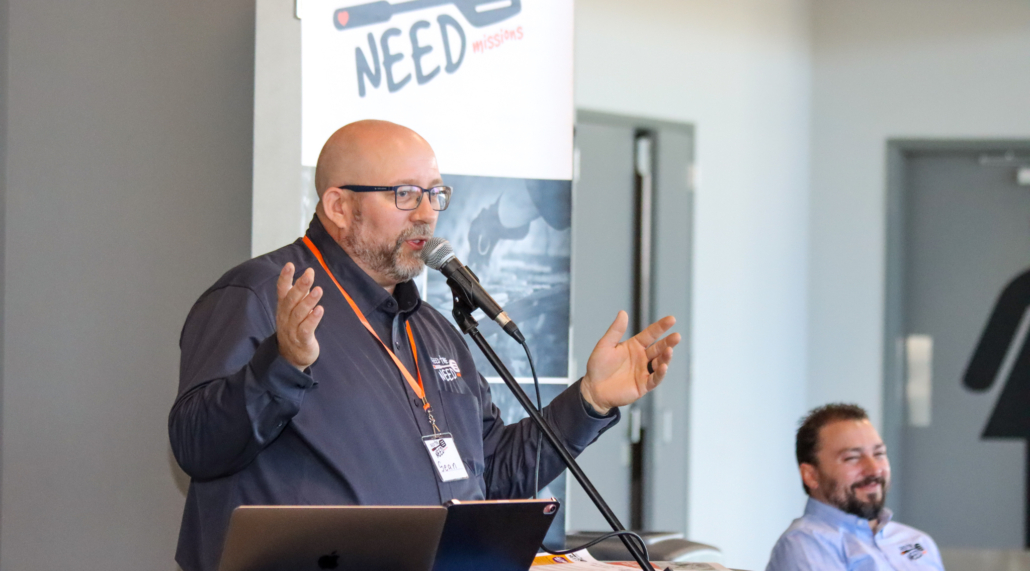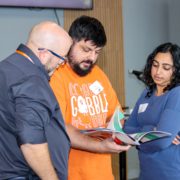Therefore go and make disciples of all nations, baptizing them in the name of the Father and of the Son and of the Holy Spirit, 20 and teaching them to obey everything I have commanded you. And surely I am with you always, to the very end of the age.”
At Feed the Need Missions, our mission is to mobilize believers to feed people physically and spiritually in their communities, while actively building disciple-making relationships. This priority of discipleship comes from the directive of Jesus in Matthew 28:19-20, and we take it very seriously. So how are disciples—and disciple-makers— built up? Read on and discover a few tips we’ve learned as we’ve served over twelve years and in numerous communities.
Tip #1: Make Room for Relationship
Nathaniel has been coming to the Bastrop-area Feed the Need Missions sites for years. One Monday night, while Nathanial was getting his food, he struck up a conversation with Feed the Need Missions President Jonah Beyer. While the two have been familiar with each other, this unplanned, unrushed conversation allowed the two to connect on a deeper level. “Just asking basic questions, I could tell that he was hungry to learn and ready for more than just food. He was super hungry for relationship,” shares Jonah.
The conversation deepened into Nathaniel’s spiritual life. Jonah felt they needed more time to really delve into this. So, because he needed to make a stop at the La Grange site, he asked if Nathaniel would like to tag along. “That 30 minute drive gave me the opportunity to intentionally ask him questions about his past, where he came from, to gain a better understanding of his current spiritual condition,” he said.
If we want to become effective disciple-makers, we have to show up. Not just physically. But with spiritual eyes wide open. Wherever we are, and whatever tasks are at hand, one essential posture is building margin into our activity to do more than task. We have to slow down. See people. Be available to talk. Take our time. Be ready to invest time and ask questions. Listen more than we talk.
We must look at every encounter not as an interruption, but rather as a divine appointment.
Tip #2: Know Your Audience
The time with Nathaniel had two benefits. For one, Jonah now had a sense of Nathaniel as a person. Second, because he had invested time and attention, he had gained perspective and relational credibility that allowed him the privilege of speaking to his life. Now he could prayerfully tailor encouragement based not on assumptions, but time spent learning this person.
The live-altering truth of Jesus Christ is unchanging. But how we present and apply that truth in discipleship isn’t a one-size-fits-all model. People have different struggles. Different temperaments. Different levels of education and learning styles. We have to know who we are talking to in order to know how to guide them to Jesus, and to holiness.
“As the conversation progressed, Nathaniel began sharing his passions with me. We had this amazing conversation about his life and his church back ground, his passion for wanting to do better and serve God, his desire to preach,” Jonah said. “He has this desire to be an influence for Christ in the gang world, because he was brought up around gang activity. He sees a pretty harsh street world that needs to be reconciled, to learn how to love.” But his hope for future ministry is only part of the story. He has significant needs himself right now, from struggling at work, to trying to be there for his two children who live apart from him, all while living in a make-shift shelter wrapped in a tarp, which is the only shelter he can currently afford.
True discipleship comes when we get a sense of a whole person. To disciple others, we should know what their hopes and passions are. But we should also have a sense of their greatest concerns and needs. Outside of sharing the hope of Jesus and praying they will accept Him, we can’t create goals or plans for people. And we have to be sure our suggestions are aligned with an understanding of the obstacles they face. Our job is to point to Christ, help them see and understand dangers they may not be aware of, remind them of promises they can stand on, and encourage them along the way.
Tip #3: Discipleship is a Team Sport
Once at the La Grange site, the two men were greeted by Dave, another volunteer. As Jonah greeted the site team and tended to things, Dave stepped in to talk to Nathaniel. “They ended up talking for like two hours,” Jonah shares. “Dave, after their conversation, really felt compelled to get housing for Nathaniel, to help him be there for his kids, help him financially, to meet some of the pressing needs he’s facing.” But again, more than physical needs, Dave felt a burden to help Nathaniel understand Jesus. “Often we see people at the sites who do not having a good understanding of the Gospel. They don’t have a real understanding of who God is. There is a disconnect about what it really means to surrender your life to the Lordship of Christ.”
As the men talked, Jace, another Feed the Need Missions staff member, approached the group and began talking to Nathaniel. “Nathaniel walked away from the evening wrecked. He told me ‘I needed this so bad. I haven’t had anybody to encourage me or speak life in to me, or help me to pursue God.’ Now here were three men making themselves available to invest in him, to see him, to listen to him, and to encourage him.”
That healthy dynamic, that consistent truth, was a significant in Nathaniel’s life; but it was an important moment for Dave, too. Before he left, Jonah was able to spend time with Dave, coaching him. To build disciple-makers, it is important to have follow up conversations, answer questions, and to encourage those who answer the call to minister to their community. Jonah then drove Nathaniel home, where he was invited into his home to pray for him in Nathaniel’s own space.
One of the most incredible things about disciple-making is that it isn’t all dependent upon one person. God has created a network of believers. Some plant seeds, others reinforce truths, still others model, and at just the right moment, the cumulative experience hits home and brings breakthrough. What is most important is not that we “close the deal,” but that we engage in the process in obedience to the Divine command we’ve been given.






